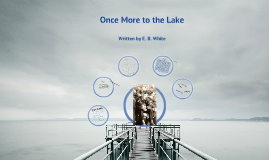
“The only thing that was wrong now, really was the sound of the place, an unfamiliar nervous sound of the outboard motors” (White). It’s only obvious to see him note the changes and therefore adopt a tone melancholy from he sees after coming back as a father. A strange observation, had it not been the theme of the essay to point out the sameness as when he was a boy. “It gave… a creepy sensation” (White).ģ “There had been three tracks to choose from in choosing which track to walk to now the choice was narrowed down to two” (White). Even the previous passage has the author stating that the “dual existence” (White) he was experiencing was from the tackle of nostalgia in how he was both his father and his child at the same time. The main idea and feeling is expressed in “It was the arrival of this fly that convinced me… that everything was as it always had been” (White).Ģ Again, the mood and tone of the piece centralizes themselves with his nostalgia, as exemplified in the passage when he sees the fly, or even as it continues as he rambles that “the boat was the same boat, the same color…” (White) and the usage of the word “same” pushes this feeling of nostalgia for the author. The key feeling he seems to revisit is a sense of nostalgia as well as the idea of how aged he seems. Reply Deleteġ The central idea of White’s essay is how despite time changing you, the audience of nature, nature itself may not change when you revisit it. White also realizes once again how the lake as not changed over the years through his son experiencing things almost identical to White’s memories. In the last paragraph, however, White focuses in on his son, hoping him passing down the lake has as great of an effect as it did on him in his childhood. White spends the majority of the essay reflecting on his time at the lake and the time he spent with his father here. “…the restlessness of the tides and the fearful cold of the sea water and the incessant wind which blows across the afternoon and into the evening make me wish for the placidity of the lake in the woods” (White). When readers imagine a body of water, they think of waves crashing rather than White’s lake White explicitly expresses the difference because it is imperative that the audience clearly understand the setting in order for White’s message to get across.ħ. White mentions the ocean in the first paragraph in order to give the audience a crystal clear image of the lake. “…the restlessness of the tides and the fearful cold of the sea water and the incessant wind which blows across the afternoon and into the evening make me wish for the placidity of a lake in the woods” (White).

As he buckled the swollen belt suddenly my groin felt the chill of death” (White).Ħ. “…he wince slightly as he pulled up around his vitals the small, soggy, icy garment. Despite his father no longer being with him, the memories they shared in his childhood live on at the lake and are passed on to White’s own son. As previously mentioned, fishing with his father had a profound effect on White. The repetition of this image proves its profound effect those times had on White.ĥ. Throughout the entire essay, White continually mentions going fishing with his father, which he does with his son. White specifically mentions the boat and the blood because of the beloved memories he has with his father on the lake. “…the boat was the same…the dried blood from yesterday’s catch: (White). “There had always been three tracks to choose from…now the choice was narrowed down to two” (White).Ĥ. Despite the great similarities, there are slight changes that White notices that shows how time has actually effected the lake on a small scale. “…suddenly it would be not I but my father who was saying the words or making the gesture” (White).ģ. White also reflects on time and how he has changed so much yet his beloved lake has not, preserving all the incredible memories White has at the lake.


White reflects on his time here with his father who had since passed, which is kind of perfect since this was the trip were he brought his own son to the lake for the first time. The tone of the piece is extremely reminiscent. “It was the arrival of this fly that convinced me beyond any doubt that everything was as it always had been, that the years were a mirage and there had been no years” (White).Ģ. The central idea of White’s “Once More To The Lake” is to not get caught up in the every changing world and value the little things, such as nature and its continuity that is so rare to find in the world and in people.


 0 kommentar(er)
0 kommentar(er)
